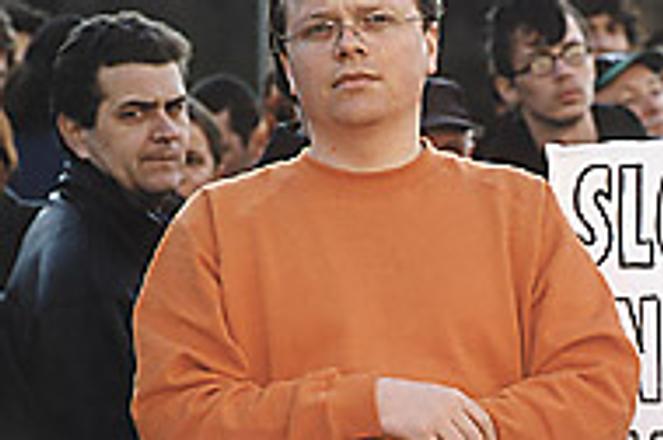The SDĽ party, represented by leader Migaš (left) and Vice-Chairman Andrášsy have supported gay rights.photo: Igor Polakovie
Leaders of Slovakia's homosexual community told a parliamentary committee March 13 that Slovak gays and lesbians needed legislation to protect their human rights. The meeting was the first official dialogue ever between Slovak members of parliament (MPs) and gay rights leaders.
The Inakosť (difference) Initiative, a coalition of Slovak gay rights organisations, appeared in front of the 10-member Parliamentary Committee on Human Rights and Nationality, calling for legislation protecting gays and lesbians in the workplace and legislation establishing registered partnerships for homosexual partners.
"[Slovakia's] homosexual minority is forced to live with fear and guilt for their emotional and sexual orientation... resulting in suicidal tendencies, neurosis, and suppressed yearning for human relationships," said Inakosť spokesman Ivan Požgai.
Slovak employees fire homosexuals with impunity, especially homosexual teachers who are thought to be unsuitable to work with children, says Požgai. And Slovak law ignores homosexual partners; Požgai cited a case where a woman was thrown out onto the street after her partner - who owned the flat where the couple lived - had died.
"Homosexuals in Slovakia don't come out with these stories because they are afraid," said Požgai. "But even if they did, the law does not protect them, or give them any basis to fight for their rights in courts."
Inakosť had failed to convince MPs to include laws barring discrimination based on sexual orientation in reform of the Constitution passed February 24. Furthermore, Paragraph 13 of a new Labour Code, approved by the government March 4, forbids discrimination on 20 different grounds, but sexual orientation is not among them.
Inakosť wants the Committee on Human Rights and Nationality to add protection for homosexuals to the Code before it goes to parliament for a vote, which is expected to happen by the end of March.
"We want it to be explicitly spelled out that workplace discrimination based on sexual orientation is illegal," said Požgai.
Coalition MPs at the meeting with Inakosť promised to help, but warned that parliament as a whole might not be ready for such a law. "I believe we can get Inakosť's demands through this committee," said committee chairman Laszlo Nagy. "But we probably won't get it passed in parliament the first time around; even so, it is important to start the process."
MPs from the opposition Movement for a Democratic Slovakia (HZDS) chafed at the discussion with Inakosť leaders, who arrived in a swirl of reporters and photographers; they accused Nagy and others of posturing.
"This is just a political game," said HZDS member of parliament Katarína Totová. Party-mate Jozef Kalman added "They [the ruling parties] are the coalition. If they really support gay rights, why didn't they include them in the Constitution they just passed?"
Nagy responded that HZDS filibustering had required Speaker of Parliament Jozef Migaš to call an early vote on constitutional reform, thereby ending further debate on the reforms and preventing the subject of gay rights from being raised in parliament. But he also admitted that the coalition was not united behind gay rights.
"When [MP Ľubomír] Andrássy spoke in parliament about discrimination based on sexual orientation, there was a very ugly response," he said. "It's not a political issue, it's an issue of tolerance. And for that, we have to be patient."
Constitutional reform required all but one of the coalition's 91 votes in parliament; passage of regular laws, however, requires only a simple majority of MPs present in the 150-seat parliament for the vote, at most 76. But even that number, says Inakosť, will be difficult to achieve, since no party is fully behind gay rights.
Inakosť leaders say they expect the conservative Christian Democratic Movement (KDH) coalition party, and its nine MPs, to staunchly oppose any law extending homosexuals rights or legal protection. The gay-rights group first bumped heads with the KDH in August 2000 when party member Alojz Rakús, a psychiatrist, said that homosexuals could be "cured", or changed into heterosexuals. Former party head and current Justice Minister Ján Čarnogurský added that laws giving gay partnerships rights equal to married couples would not be passed on his watch because they "degrade the family".
"Homosexuals should not be discriminated against in the workplace," said Rakús March 14. "But exceptions need to be made in professions [i.e. teaching] that affect our youth."
Inakosť leaders say they are infuriated by such statements, which they feel imply that homosexuals are perverts or paedophiles. They add, however, that the KDH has unwittingly helped their cause.
"The controversy with the KDH helped us bring the issue to the forefront. And now we're here today in front of a parliamentary committee, which is a big step forward," said Požgai.
Požgaj added that he was optimistic that when the Labour Code is passed in the upcoming months, it would bar discrimination based on sexual orientation; if it doesn't, he said Inakosť would continue its high-profile fight, including rallies and public discussions, until the Code was amended.
The law on registered partnerships, which would give homosexual partners the same legal status as married couples, could be an even longer battle. Nagy promised to deliver a bill on registered marriages to parliament by this autumn, but he and Inakosť leaders predicted that it would take several years, and several bills, before it would be passed by parliament.
But Požgai says his group is supported by European trends, and that once a society opens debate on homosexual rights, legislation inevitably follows.
"There is no going back for Slovak society," he said. "Sooner or later these laws will be passed, it's only a question of time."


